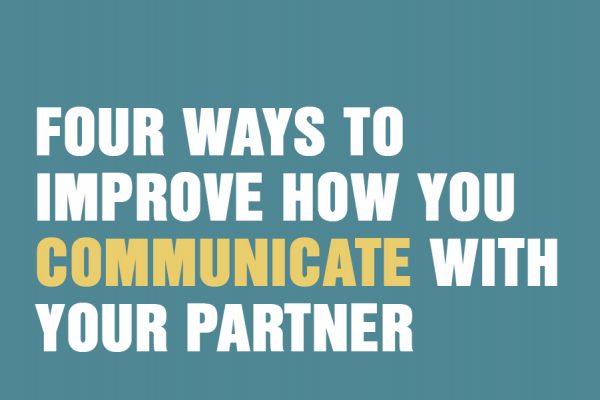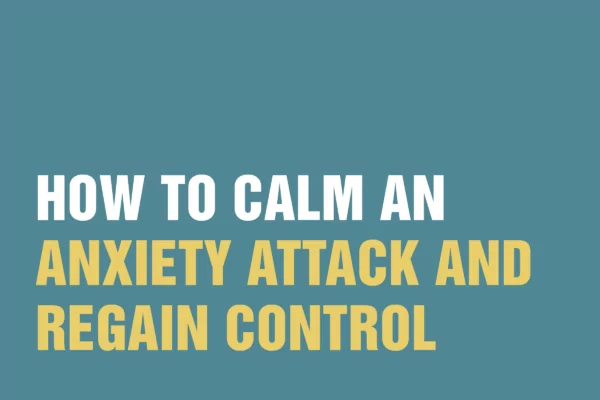Most of us will feel anxious at some point in our lives, especially around big events like job interviews, exams or public speaking. But people with anxiety disorders will experience far more than a few butterflies in their stomachs. Anxiety symptoms can be on a spectrum ranging from nagging daily worry to full-blown panic attacks.
There are an estimated eight million people living with some form of anxiety in the UK, and women are more likely to suffer from anxiety than men. Anxiety is one of the most searched terms by people seeking support for their mental health.
Someone with anxiety may feel isolated, overwhelmed and helpless. It can be hard to see someone you care about deal with anxiety on a daily basis – but what can you do? Let’s explore how to help someone with anxiety, as well as the importance of seeking professional support to help them get their wellbeing back on an even footing.
What is anxiety disorder?
Anxiety is the feeling of fear and dread in anticipation of a future threat. There is a real evolutionary purpose to anxiety – it can be a generally useful emotion, but some people find it hard to regulate their anxiety, and it gets the better of them, overtaking their lives to an extent.
When someone is anxious in response to a perceived threat, their fight-or-flight mechanisms are triggered and adrenaline surges through their body. That’s why anxiety can have physical as well as emotional effects. Adrenaline can even be triggered when the threat is minor or imagined. An anxious person may build up a threat in their minds to be all-consuming, and they may find it difficult to regulate their emotions once the adrenaline has been triggered. This could cause them to behave in unhelpful, sometimes obsessive or compulsive ways, or with avoidant behaviours, to help them escape their fears.
Symptoms of anxiety
The manual that psychiatrists use to diagnose generalised anxiety disorder includes the following symptoms and behaviours, which you may recognise if you have someone in your life suffering from anxiety:
- Excessive worry about a variety of events, activities or topics that lasts for at least six months – even when there is nothing wrong. They may even start to worry about worrying, and spend a lot of their day worrying.
- Difficulty to control worrying
- A need for constant reassurance.
- Feeling on edge
- Becoming tired easily
- Lower levels of concentration
- Higher levels of irritability
- Muscle aches
- Difficulty falling asleep or staying asleep
- Nausea
- Dizziness
- Sweating
If someone in your life suffers from anxiety, these symptoms may affect their day-to-day functioning, such as in social situations (for example, cancelling a meet-up at the last minute) and in close relationships – this could be a sign of social anxiety in particular.
Types of anxiety disorders
Not all anxiety is the same – there are different types of anxiety disorders. Below are the five major types of anxiety disorder:
- Generalised Anxiety Disorder (GAD) – This is a long-term condition where the sufferer feels anxious about a range of issues and situations, rather than a specific event. People living with GAD will likely feel anxious most days.
- Obsessive-Compulsive Disorder (OCD) – Most of us have heard of OCD, but did you know it is a form of anxiety? OCD can cause obsessive thoughts and compulsive behaviours, usually as a means of trying to ease feelings of anxiety or unease.
- Post-Traumatic Stress Disorder (PTSD) – Many believe that PTSD is experienced only by ex-soldiers, or those who have suffered a near-death experience, but this isn’t the case. PTSD can develop after exposure to a traumatic event – but the trauma is subjective to the individual. The traumatic event usually involves serious physical harm to themselves or others. The sufferer may experience flashbacks, nightmares and significant anxiety as a result.
- Panic Disorder – This is an anxiety disorder where the sufferer experiences repeated episodes of intense fear, accompanied by more physical symptoms, such as heart palpitations, anxious thoughts, chest pain and dizziness.
- Social Anxiety Disorder – Also known as social phobia, this form of anxiety presents as an intense, persistent fear of being judged or watched by others, resulting in a reluctance to be around people. This can affect performance at work, school or even family relationships.
How to help someone with anxiety
It can feel exhausting to be around a friend, family member or loved one with anxiety, especially if they are constantly hyper-vigilant to the tiniest threat. It’s said that anxiety can be contagious, and you may start feeling anxious just by being around them. If their symptoms are frequent and extreme, you may want to suggest they have a chat with their GP to get professional medical advice and to see if medication might be appropriate. Anxiety may not go away, but it can be managed.
This is how to help someone with anxiety, in our experience as psychotherapists working with people with an anxiety disorder.
Take them seriously
People with anxiety hate not being believed. The threat they perceive may be minor, but their response to it may be major. They often can’t differentiate between high and low threats, so the smallest of things might set off a series of panic attacks. Their condition isn’t just in their head. It can manifest in physical symptoms too. Don’t belittle or dismiss them. Take the time to listen, to take on board their concerns and to talk things through. Telling them not to worry simply won’t work – in fact, it’s more than likely to set them back and make their anxiety worse.
Accept they’re not doing it on purpose
The person with anxiety isn’t being jumpy on purpose. The system that regulates their anxious responses is out of check and they struggle to regulate it. The more you understand their anxiety and their triggers, the more patient you will be.
Reassure where you can – but set healthy limits
One of the antidotes to anxiety is evidence that the threat is not there anymore. Anxiety sufferers often seek constant reassurance. For example, if the person is anxious about you driving somewhere, you may want to text as soon as you arrive. Agree that you will do this in advance so they know what to expect. Don’t be dragged into a circle of constant reassurance, however. You can’t be available twenty-four hours a day to soothe someone’s anxiety. It’s important for your loved one to have emotional support, but you need to care for your own mental health, too.
Don’t let them sit with not knowing
A major source of anxiety is not knowing. If there is a void of communication, the anxious person can fill that void with catastrophic thoughts and worst-case scenarios – this is known as catastrophising, and it’s very common for someone suffering from anxiety and other mental health issues, such as severe depression.
Keeping an anxious person in the loop can really help in situations like this. If you’re busy all afternoon, for example, tell the person they won’t hear from you until after 6 pm. This knowledge could help to avoid a panic attack or an anxiety spiral.
Encourage them to help themselves
Exercise, meditation, yoga, breathwork, journaling – these are all self-help tools that can help someone with anxiety manage their symptoms and their triggers. It’s hard to be anxious when you’re pounding the treadmill or concentrating on deep breathing. You may also want to help them identify ways of bringing themselves down from the adrenalin high – whatever brings them back into their body. This could be a calming image, a scent or a sound.
Seek professional support
Therapy, including cognitive behavioural therapy (CBT) and longer-term psychotherapy, can help an anxious person identify their triggers and learn ways to manage them. Therapy can also work on the root causes of anxiety, which may reach back into childhood.
If you or your friend or loved one would like to take the first step into seeking professional support for their anxiety, call our Front of House team on 020 8673 4545 and they will match you with a therapist experienced in working with anxiety. You can also book your session by emailing [email protected]







